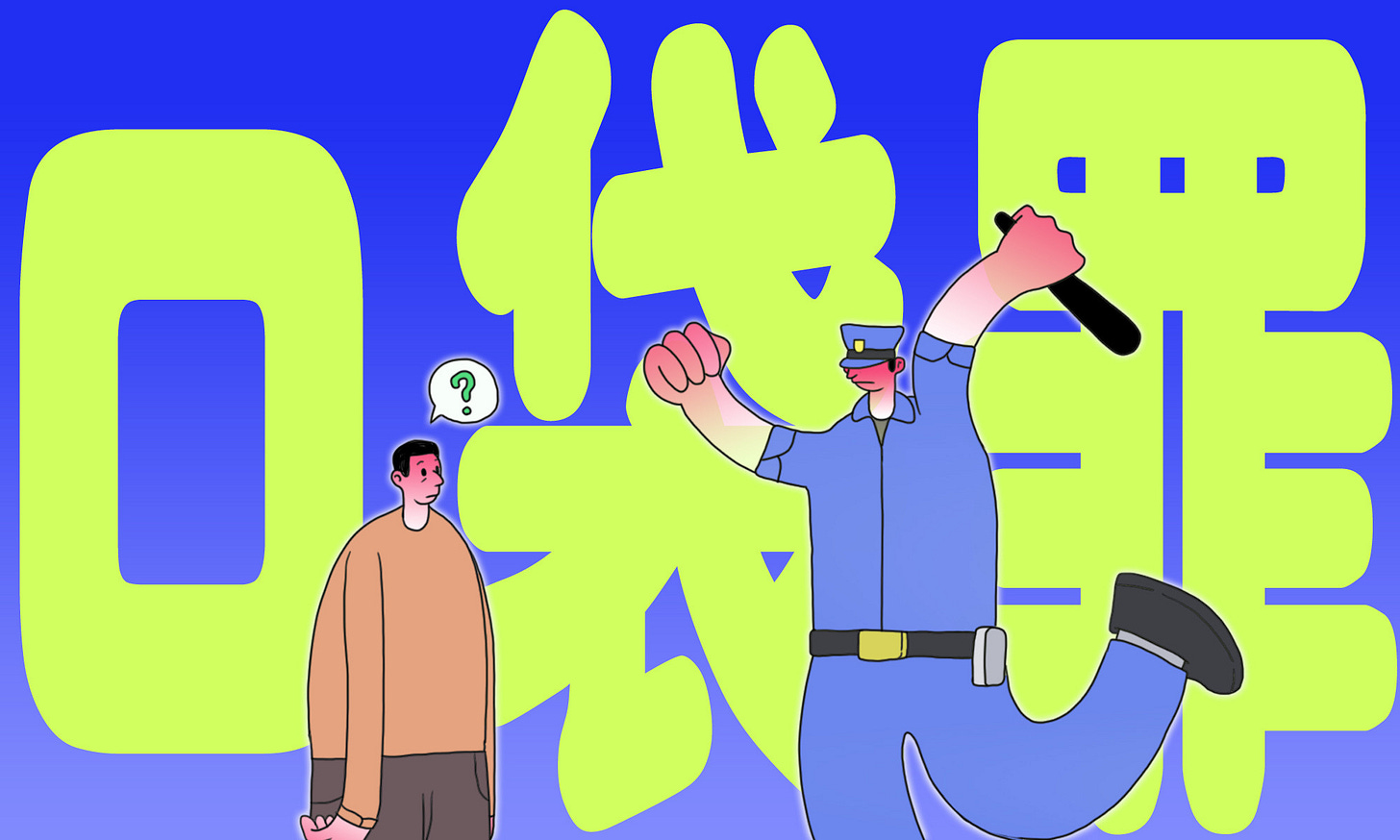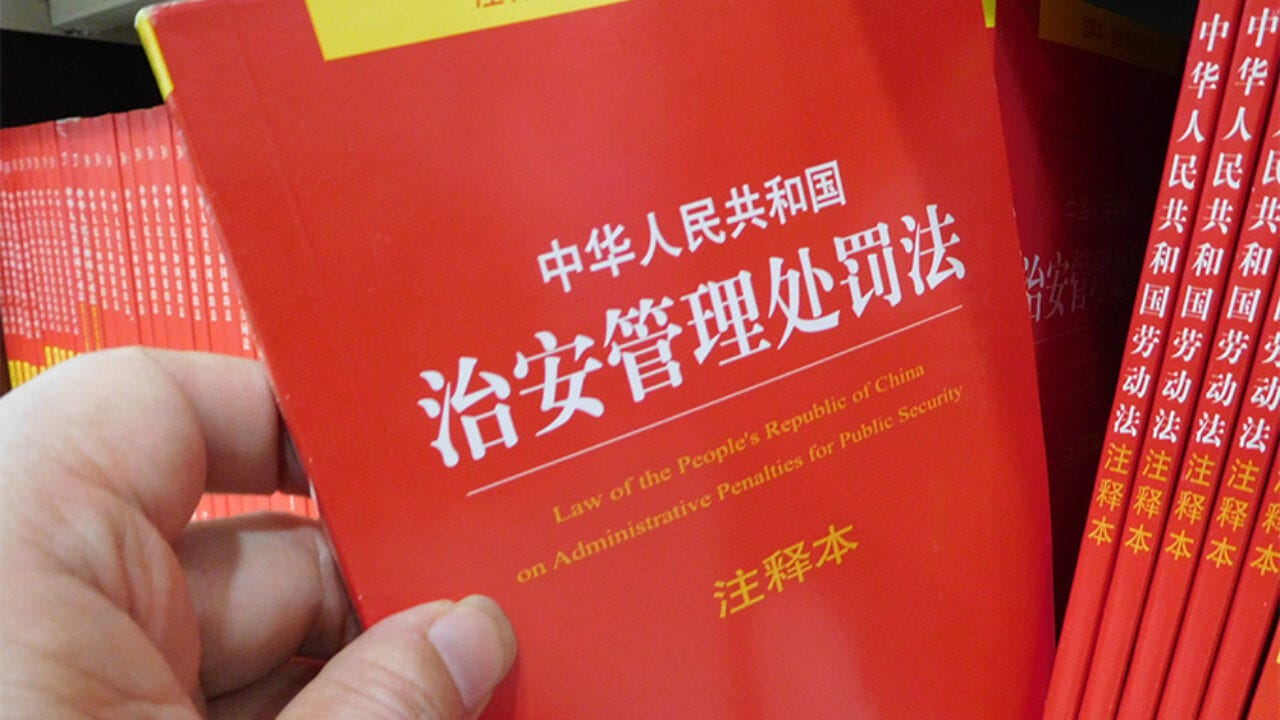Draft amendment to law causes online uproar
"Harmful to the feelings of the Chinese people" is a pocket crime
Welcome to RealTime Mandarin!
It’s a free weekly resource helping you learn contemporary Chinese in context, maintain and improve your Mandarin skills, and stay on top of the latest language trends in China.
Subscribe now to get the next newsletter in your inbox on Saturday.
A draft amendment to China’s Public Security Administration Punishments Law (治安管理处罚法 zhì'ān guǎnlǐ chǔfá fǎ) was published on the Chinese People’s Congress website on 5 September.
The draft is published for public consultation (征求意见 zhēngqiú yìjiàn) before China’s lawmakers finalize changes to the law.
One proposal in the draft has sparked debate in China:
In this revision, the second and third paragraphs of Article 34 indicate newly added behaviours that should be punished, including "wearing in public places clothes and accessories that are detrimental to the spirit of the Chinese nation, and hurt the feelings of the Chinese nation”; and "producing, disseminating and publicizing things or remarks that are harmful to the feelings of the Chinese people".
在该修订中,第三十四条的第二款和第三款意见显示了新增应处罚的事项,包括“在公共场所穿着、佩戴有损中华民族精神、伤害中华民族感情的服饰、标志的;制作、传播、宣扬、散布有损中华民族感情、伤害中华民族感情的物品或者言论的。”
Punishments under the draft changes include detention of up to 15 days and fines up to 5000 yuan.
But what counts as “hurting the feelings of the Chinese people”?
It’s vague and subjective, as one commentator notes:
The meanings of "harming the spirit of the Chinese nation" and "hurting the feelings of the Chinese people" are ambiguous. If implemented, it may be a typical "pocket crime" which is likely to be abused.
“有损中华民族精神”、“伤害中华民族感情”含义模棱两可。如果实行的话,则可能是典型的“口袋罪”。有可能同饱受争议的寻衅滋事罪和曾经的流氓罪一样,极大可能被滥用。[1]
And it's reminiscent of another over-used and abused legal instrument, which we have learned about in this newsletter: 寻衅滋事 xún xìn zī shì - “provocation and troublemaking”.
So, where will these proposed changes to the law stop when it comes to hurting the feelings of the Chinese people…?
What exactly do you mean by “clothing and accessories that hurt the feelings of the Chinese nation”?
Does wearing a suit harm the spirit of the Chinese nation?
Or is the performance of the Chinese men's football team over the past decade considered "damaging the spirit of the Chinese nation"? Does it not call for subjective judgement to determine the crime and dish out punishment?
“伤害中华民族感情的服饰、标志”到底指的是什么?
穿西装是否有损中华民族精神?
又譬如中国男足这十几年来的表现,又算不算“损害中华民族精神”?
认定并处罚那算不算带有主观意识?[2]
So that’s what we explore this week!
🎧What you’re missing in the member podcast 🎧
Today’s member podcast episode includes 33 minutes of native Chinese audio, going deeper into this story, some of the language we learn we learn, and the full featured article we read this week. It also includes a full transcript!
Sign up now to become a member, unlock the audio, and all the other member benefits!
Favourite Five
1. 含糊 hán hu
vague, unclear
草案条款概念含糊,没有明确的界定标准,成了热议的焦点 - The concept behind the draft clause is vague, with no clear defining criteria, which has become the focus of heated discussions. [2]
Related:
模糊 mó hu - blurry, fuzzy
含糊其辞 hán hú qí cí - vague
2. 口袋罪 kǒu dài zuì
pocket crime
如果实行的话,则可能是典型的“口袋罪” - If implemented, it could potentially be a classic "pocket crime". [1]
More: A legal term for “catch-all” laws that are easily abused. Read more in The China Project.
3. 模棱两可 mó léng liǎng kě
ambiguous
第二款、第三款中提到的“有损中华民族精神”、“伤害中华民族感情”含义模棱两可 - The meanings of "harming to the spirit of the Chinese nation" and "hurting the feelings of the Chinese nation" mentioned in the second and third clauses are ambiguous. [1]
4. 人人自危 rén rén zì wēi
everyone feels insecure
别说自由言论,就是任何一句话都可以装到极其模糊的概念里,人人自危 - Forget about freedom of speech; even a single sentence can fall under this extremely vague concept, making everyone feel insecure. [2]
5. 欲加之罪,何患无辞 yù jiā zhī zuì, hé huàn wú cí
when you want to accuse someone, there's no lack of a pretext
如果公职人员可以凭个人偏好和观念信条,随意扩张解释和适用法律,那么我们距离“欲加之罪,何患无辞”也就不远了 - If public officials can interpret and apply the law arbitrarily based on their personal preferences and ideological beliefs, then we are not far from the situation where "when you want to accuse someone, there's no lack of a pretext." [3]
Note: A well-known colloquial phrase which originates from The Commentary of Zuo (左传) written during the 4th century BC about the Spring and Autumn period in Chinese history.
Consuming the Conversation
Useful words
6. 筐 kuāng
basket, category
该观点认为一些法律人质疑寻衅滋事是法律的耻辱,是个筐,什么都往里装,实际这是巨大的误解 - This viewpoint believes it is a gross misunderstanding that some legal experts view picking fights and starting quarrels as a disgrace to the law, because it is like a basket where everything can be thrown in. [2]
7. 压制 yā zhì
suppress, oppress
进一步恶化公共领域的舆论环境,不当压制个人在日常穿衣与言论的自由空间 - It further poisons public discourse and improperly suppresses individuals' freedom of clothing and speech. [2]
8. 无边 wú biān
boundless, limitless
无疑就是肆意扩大处罚范围,最终导致权力无边 - Undoubtedly, it is an arbitrary expansion of the scope of punishment, ultimately leading to boundless power. [2]
9. 溢出 yì chū
overflow, spill over
很多新增的违法行为其实已溢出治安管理的范畴 - Many newly added illegal behaviors actually no longer belong to the realm of public security management. [3]
10. 滋生 zī shēng
to breed, to foster (negative connotations)
否则对新兴违法行为的打击和压制很有可能滋生出不受约束和控制的权力 - Otherwise, the crackdown and suppression of newly defined illegal behaviors is very likely to foster unchecked and uncontrolled power. [3]
11. 消弭 xiāo mí
to silence or eradicate
既要清晰地划定需要国家惩罚权介入的领域,也要避免法律与道德边界的消弭 - We need to clearly delineate the areas where the state's punitive power should intervene while also not blurring the boundary between law and morality. [3]
12. 汉奸 hàn jiān
traitor, collaborator
我认为那篇文章没有伤害谁,但是后台确实有不少人攻击我是“汉奸” - I believe that the article didn't harm anyone, but there were indeed many people accusing me of being a "traitor". [3]
Three-character phrases
13. 流氓罪 liú máng zuì
hooliganism, thuggery
有数百万人仅仅因为“私生活问题”而被以流氓罪论处 - There are millions of people who have been convicted of "hooliganism" simply because of "issues in their private life”. [1]
Idioms
14. 一视同仁 yí shì tóng rén
treat everyone impartially
如果伤害了,应该也一视同仁法办吧 - If harm has been done, it should also be handled impartially and equally under the law, shouldn't it? [1]
15. 众口难调 zhòng kǒu nán tiáo
it's hard to please everyone
俗话说“众口难调”,任何新事物出来的时候总会听到不同的声音 - As the saying goes, "It's hard to please everyone", so when anything new emerges, you will always hear different opinions. [2]
16. 各抒己见 gè shū jǐ jiàn
express one's own views
有人赞成有人反对,都在各抒己见 - Some people agree, and some disagree; everyone is expressing their own views. [2]
17. 鸡毛蒜皮 jī máo suàn pí
trivial matters
传统媒体不敢发声,不能发声。只能把目光聚焦在普通人的家长里短,鸡毛蒜皮上 - Traditional media dares not speak out, and they are not allowed to speak out. They can only focus their attention on the trivial matters and minor details of the lives of the ordinary people. [3]
18. 震耳欲聋 zhèn ěr yù lóng
deafening
关于《治安管理处罚法》,媒体的沉默震耳欲聋 - On the topic of the "Public Security Administration Punishment Law," the silence of the media is deafening. [3]
19. 万马齐喑 wàn mǎ qí yīn
complete silence
媒体的集体沉默我能理解,但看到这万马齐喑的画面,还是觉得悲凉 - I can understand the collective silence of the media, but when I see this scene of complete silence, it still feels disheartening. [3]
Phrases
20. 冤假错案 yuān jiǎ cuò àn
wrongful convictions
反而会极大地扩大执法部门的权力,导致冤假错案频发 - Instead, it will greatly expand the power of law enforcement agencies, leading to frequent occurrence of wrongful convictions. [1]
21. 入罪入罚 rù zuì rù fá
to be criminalised and penalised
冒犯民族感情是否应入罪入罚,一直是舆论的热点话题 - Whether or not offending the feelings of a nation should be criminalized and penalized has always been a hot topic in public discourse. [3]
22. 奇装异服 qí zhuāng yì fú
unconventional clothing and costumes
每年动漫节就可以抓一轮的人,个个奇装异服,全部伤害民族感情 - Every year during the anime convention, they can round up a bunch of people who dress in unconventional clothing and costumes that can harm national sentiments. [2]
23. 警民矛盾 jǐng mín máo dùn
police-civilian conflicts
容易给腐败的滋生创设新的空间,也可能激化警民矛盾,给社会稳定带来新的风险 - It can easily create new room for corruption and may also exacerbate police-civilian conflicts, bringing new risks to social stability. [2]
24. 同案不同判 tóng àn bù tóng pàn
different sentences for the same crime
由于上述法条的立法语言不够准确,很可能导致自由裁量空间过大、同案不同判的结果 - Due to the lack of precision in the legislative language of the above-mentioned legal provisions, it can easily result in excessive discretionary power and different sentences for the same crime. [2]
Become a member of RealTime Mandarin+
The RealTime Mandarin+ membership is a multimedia resource helping you learn contemporary Chinese in context
If you enjoyed reading the free newsletter, you’ll LOVE our paid membership: RealTime Mandarin+.
Joining Real-Time-Mandarin+, you’ll unlock loads of extra resources to help you dramatically improve your Chinese language skills.
Every week you get access to new content:
🔈Podcast - 30 min podcast every Saturday with 80% native Mandarin (including transcript)
📚 Resources and integrations - Pleco, Skritter, Hack Chinese, mylingua (new!), and PDF printouts
👩🎓 Intermediate newsfeed - One ‘real’ Chinese language news podcast and article published every Sunday, in a lesson format, pitched at an intermediate level
💬 Community - Slack community, Substack Chat, online meet-ups, in-person gatherings
🤿 Quarterly Deep Dives - One hour webinars focussing on one key challenge of intermediate learners delivered around the end of every quarter.
When you join, you’ll also have an optional 1-1 onboarding and coaching call to help orientate you.
It’s the best way to get motivated, inspired, and kick-start your Mandarin learning habit.
You can access all of these resources for less than the cost of one pint per week in a London pub.
It’s a no brainer (and much better for you)!
So, if you’ve been on the fence for a while, now is the time to confront it, invest in yourself, and commit!
Happy learning!
Andrew





